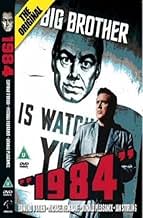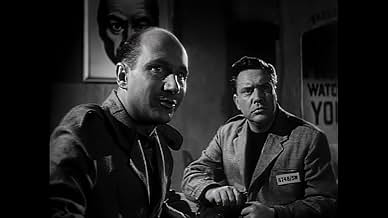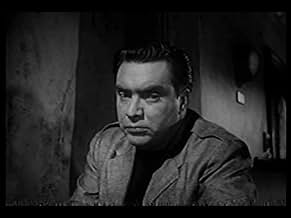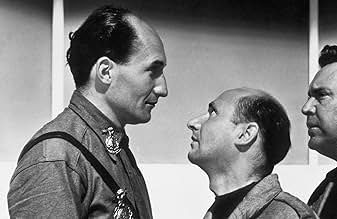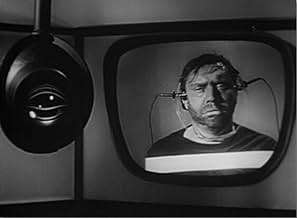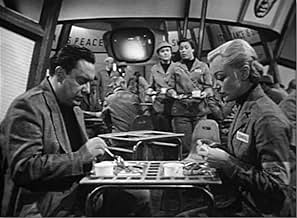PUNTUACIÓN EN IMDb
6,9/10
4,6 mil
TU PUNTUACIÓN
En una sociedad totalitaria del futuro, Winston Smith, cuyo trabajo diario es reescribir la historia, intenta rebelarse enamorándose.En una sociedad totalitaria del futuro, Winston Smith, cuyo trabajo diario es reescribir la historia, intenta rebelarse enamorándose.En una sociedad totalitaria del futuro, Winston Smith, cuyo trabajo diario es reescribir la historia, intenta rebelarse enamorándose.
- Dirección
- Guión
- Reparto principal
Donald Pleasence
- R. Parsons
- (as Donald Pleasance)
Kenneth Griffith
- Prisoner
- (as Kenneth Griffiths)
Barbara Cavan
- Woman
- (voz)
- (sin acreditar)
Walter Gotell
- Guard
- (sin acreditar)
Anthony Jacobs
- Telescreen
- (voz)
- (sin acreditar)
Barbara Keogh
- Special Woman
- (sin acreditar)
Bernard Rebel
- Kalador
- (sin acreditar)
Reseñas destacadas
I finally was able to see this film, having seen the 1984 version with John Hurt when I was in college. I recall the 1984 version having some good production values, but I remember being disappointed also. This version was well-cast, and the art direction was also competent. Edmund O'Brien turned in a great performance as Winston Smith. I think that he brought a great quality of desperation to the role; which seemed to run contrary to John Hurt's performance. I'm sure there was a lot left out of the book. But I get tired of hearing people moan and groan about the argument of literature vs. cinema. Come on people, film is time-based, and can't digress like novels can. The screenwriter/director mainly extracts plot points, and can't be bothered with too much exposition (unless of course they have a whopping budget!). I've read many criticisms where more skeptical viewers complain that we don't get to know Big Brother's motives, strategy, etc... What?!! It's Big Brother - an enigmatic and probably non-existent despot....you're not supposed to know his whole story! The love affair, although brief, is very empathetic. In lieu of all the paranoia, Big Brother-cheerleading, etc. - the love between Winston and Julia is a good emotional oasis. Even though I watched a poor copy of this version, it really did make an impression. One of the few criticisms I have is Room 101. I thought the rat shot/scene was truncated, and could've been dramatized more. That's where the John Hurt version trumps this one.
Good, and I do really mean GOOD, dystopian Sci-Fi is the only (sub-) genre in cinema that occasionally manages to frighten me or make me feel uncomfortable. Titles such as "Soylent Green", "Z. P. G", or the more recent "Children of Men" are deeply disturbing not because we will be battling alien races or intelligent robots in the not-so-distant future, but because mankind itself made the planet unlivable. George Orwell, and his uniquely magnificent novel "1984", is probably the founding father of dystopian SciFi (although the influence of "Metropolis" is also unneglectable) and it's still one of the most horrifying tales ever written as far as I'm concerned.
Admittedly "1984" didn't turn out to be the phenomenal movie I secretly hoped it would be. It's an engaging, competently made, and absorbing transfer of Orwell's totalitarian nightmare from paper to screen, but some things are missing. I just didn't feel it. I didn't feel Big Brother's eyes penetrating in my back, I didn't feel the Inner Party's tyrannical madness, or their greed to own and control every human being's life. I didn't feel Winston and Julia's desperate desire to live in complete freedom. Perhaps the year of release, 1956, was still a bit too early to turn the novel into a motion picture. Director Michael Anderson somewhat fails to recreate the bleak and depressing atmosphere, as well as the dauntingly monotonous set-pieces, of a truly miserable dystopian world. 20 years later, however, Anderson would prove himself certainly capable of doing so with "Logan's Run". The 70s were just the ideal decade for dystopian Sci-Fi.
Of course, I would like to finish by underlining that "1984" is nevertheless a very good film, and worth tracking down for fans of the Sci-Fi genre, as well as George Orwell admirers. Several aspects are fantastic, notably the strong performances of the emotional Jan Sterling and the stoic Michael Redgrave. There are a handful effectively disturbing highlights as well, like the inspection rituals Winston has to endure in his own apartment, the public promoting of events like "hate-week" or the persona of young Selena Parsons, who has been so completely indoctrinated by Big Brother that she even becomes terrifying to her own neighbor and father (the stupendous Donald Pleasance in an early role).
Admittedly "1984" didn't turn out to be the phenomenal movie I secretly hoped it would be. It's an engaging, competently made, and absorbing transfer of Orwell's totalitarian nightmare from paper to screen, but some things are missing. I just didn't feel it. I didn't feel Big Brother's eyes penetrating in my back, I didn't feel the Inner Party's tyrannical madness, or their greed to own and control every human being's life. I didn't feel Winston and Julia's desperate desire to live in complete freedom. Perhaps the year of release, 1956, was still a bit too early to turn the novel into a motion picture. Director Michael Anderson somewhat fails to recreate the bleak and depressing atmosphere, as well as the dauntingly monotonous set-pieces, of a truly miserable dystopian world. 20 years later, however, Anderson would prove himself certainly capable of doing so with "Logan's Run". The 70s were just the ideal decade for dystopian Sci-Fi.
Of course, I would like to finish by underlining that "1984" is nevertheless a very good film, and worth tracking down for fans of the Sci-Fi genre, as well as George Orwell admirers. Several aspects are fantastic, notably the strong performances of the emotional Jan Sterling and the stoic Michael Redgrave. There are a handful effectively disturbing highlights as well, like the inspection rituals Winston has to endure in his own apartment, the public promoting of events like "hate-week" or the persona of young Selena Parsons, who has been so completely indoctrinated by Big Brother that she even becomes terrifying to her own neighbor and father (the stupendous Donald Pleasance in an early role).
9/11/01 is the date we lost a lot of freedom, perhaps irrevocably. Whether we move into the society that George Orwell describes in 1984 or retain a significant measure of individuality is up to us. But we will sacrifice a lot for security.
Which in Orwell's world written in the late Forties the target date was 1984. Like On The Beach Orwell got the date wrong, but doesn't mean it still can't happen. Atomic war came in 1965 and the world divided into three great super republics, people's republics if you will. Our American leads in a mostly British supporting cast, Edmond O'Brien and Jan Sterling, are from different factions. O'Brien is a member of the Inner Party with a drone like job who is starting to question assumptions on wish his society is built. Among them marriage is tightly controlled with love not a factor. But he does fall for Jan Sterling of the Outer Party.
In a country with constant monitoring, privacy is what they want. But there is no right to privacy and surveillance goes way beyond what we have post 9/11. Sterling and O'Brien pay big time for wanting some alone time.
Besides Sterling and O'Brien other performances to point out are Michael Redgrave as O'Brien's superior at work, Donald Pleasance as another drone worker who is also a graduate of the state's re-education facility and David Kossoff as the kindly old antique dealer who turns out to be something else.
The society most resembling the Orwellian 1984 is that of North Korea with their hermetically sealed country with a cult of secular worship of the ruling family. If the people there shake loose from the tyranny of the People's Republic it might be a great indication of hope for people who will insist on their individualism. Are we sliding in that direction? Time will tell.
1984 has had a few different versions made for big and small screen. This one can stand with any of them.
Which in Orwell's world written in the late Forties the target date was 1984. Like On The Beach Orwell got the date wrong, but doesn't mean it still can't happen. Atomic war came in 1965 and the world divided into three great super republics, people's republics if you will. Our American leads in a mostly British supporting cast, Edmond O'Brien and Jan Sterling, are from different factions. O'Brien is a member of the Inner Party with a drone like job who is starting to question assumptions on wish his society is built. Among them marriage is tightly controlled with love not a factor. But he does fall for Jan Sterling of the Outer Party.
In a country with constant monitoring, privacy is what they want. But there is no right to privacy and surveillance goes way beyond what we have post 9/11. Sterling and O'Brien pay big time for wanting some alone time.
Besides Sterling and O'Brien other performances to point out are Michael Redgrave as O'Brien's superior at work, Donald Pleasance as another drone worker who is also a graduate of the state's re-education facility and David Kossoff as the kindly old antique dealer who turns out to be something else.
The society most resembling the Orwellian 1984 is that of North Korea with their hermetically sealed country with a cult of secular worship of the ruling family. If the people there shake loose from the tyranny of the People's Republic it might be a great indication of hope for people who will insist on their individualism. Are we sliding in that direction? Time will tell.
1984 has had a few different versions made for big and small screen. This one can stand with any of them.
......is even better. One might be tempted to call this a remake, and I suppose it is, but it was the first theatrical rendition, enabling audiences to watch Big Brother (watching them) on a bigger screen than was possible via the BBC/Peter Cushing version (1954) of two years earlier. I agree with previous commentator "bux's" observance that, while Edmond O'Brien and Jan Sterling may not have been Orwell's first casting choices for Winston and Julia for the reason stated, the sterling performances generated by the leads and their supporting cast more than compensate. As a huge fan of the late, great Hammer Films luminary Michael Ripper, I was especially pleased to see him helping to take up the rear as an Outer Party Orator, exemplifying the tender loving care with which producer N. Peter Rathvon saw fit to cast even the smaller roles.
The destruction of love is what we see here effectivly in all aspects of society.
the destruction of the family , an enemy that is artificial , control of the history .
It is scary and maybe far more nearby to us now than ever before because some aspects are now pretty actual in this so called crisis , like fear for eachother and isolation from another .
¿Sabías que...?
- CuriosidadesSonia Orwell, widow of George Orwell, objected to the changed ending, and had this movie withdrawn from circulation.
- Citas
O'Connor of the Inner Party: You will be hollow. We will squeeze you empty and fill you with ourselves, with love of Big Brother.
- Versiones alternativasThere are two endings to this film. The UK version ends with a defiant Winston Smith and Julia being executed by the authorities. The US version is more faithful to Orwell's book and concludes with Winston and Julia being brainwashed into becoming loyal followers of "Big Brother."
- ConexionesFeatured in Hollywood and the Stars: The Angry Screen (1964)
Selecciones populares
Inicia sesión para calificar y añadir a tu lista para recibir recomendaciones personalizadas
- How long is 1984?Con tecnología de Alexa
Detalles
- Duración
- 1h 30min(90 min)
- Color
Contribuir a esta página
Sugerir un cambio o añadir el contenido que falta

